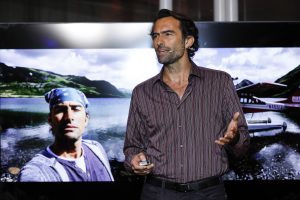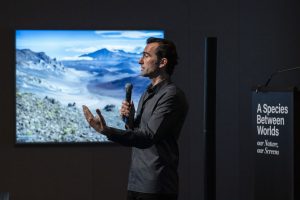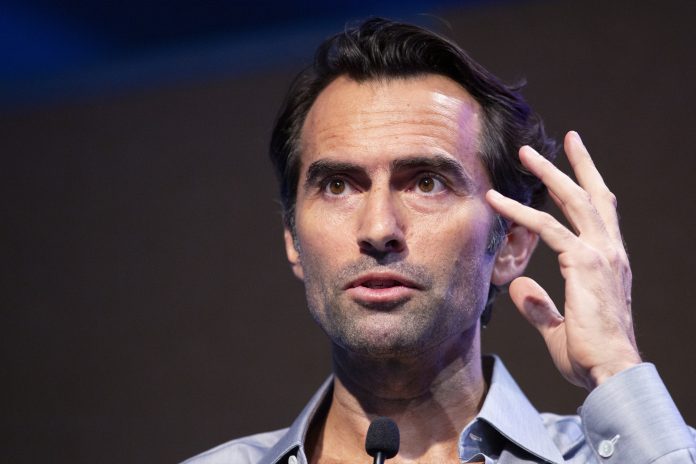‘It’s HAI Time: Ensuring Human-Centeredness Before It’s Too Late’, a provocative talk on what it means to be human-centered in a world of artificial intelligence
Author and artist John Mack addressed Stanford’s Institute for Human-Centered AI on Wednesday, May 10 on the rise of AI, the existential threat it poses to humanity, and the opportunity for a deeper connection to ourselves.
In a refreshing yet challenging provocation, John Mack explored today’s virtual realities—from Pokémon GO to the Metaverse—to reveal the virtual realities within ourselves and to uncover a deeper awareness on what it truly means to be ‘human-centered.’
If we fail to realize human centeredness in our inner world, John Mack argues, AI will only further augment the off-centeredness of our outer world. Can we realise human-centeredness before it is too late? And what would it take?
The ticketed, hour-long event at Stanford included a Q&A session giving the audience the chance to directly quiz John Mack about his hopes and fears for humanity in an AI world.
Since 2016, author and artist John Mack has committed himself to one of the most pressing conversations of our times: the digital takeover of human consciousness. He is the founder of the non-profit Life Calling, whose mission is to preserve our humanity in the digital age.
 His exhibition A Species Between Worlds: Our Nature, Our Screens, which explores the role of virtual universes in the future of humanity, attracted sell-out crowds when it debuted in New York last year, and a scaled-down version will take centre-stage at the USA’s Pavilion at the London Design Biennale in June.
His exhibition A Species Between Worlds: Our Nature, Our Screens, which explores the role of virtual universes in the future of humanity, attracted sell-out crowds when it debuted in New York last year, and a scaled-down version will take centre-stage at the USA’s Pavilion at the London Design Biennale in June.
‘I’m pro-humanity, which can also be pro-technology—one does not have to negate the other,’ says John Mack. ‘Personally I’m excited about artificial intelligence—but more than anything, I am excited about the questions AI is raising regarding what it means to be human. If humanity fails to step up to the plate, leaving technology to grow on its own, we’re just going to be further entrenched in a world where we can’t distinguish between illusion and reality. We’re going to be put in the hands of such manipulative power that we won’t even know which way is up or down.’
John Mack’s address to Stanford this week comes at a time when AI is dominating the headlines. Last week, one of the founding fathers of the AI movement resigned from Google so he could speak freely about the potential dangers of AI.

Geoffrey Hinton, who joined Google in 2013, told The New York Times that he feared the race to deploy generative artificial intelligence will result in a torrent of fake imagery and text, leaving people unable to tell ‘what is true anymore’. The former Google VP said he also worried that AI will eliminate jobs and even possibly endanger humanity if it gets ‘smarter than people.’
In April, German photographer Boris Eldagsen refused a prestigious award after submitting an image generated by AI. His picture of two women won the creative open category at the Sony world photography awards but he turned down the prize, saying he hoped his actions would spark a debate about artificially-generated images in society.
ABOUT JOHN MACK
John Mack is an artist, photographer, author, lecturer and the founder of the non-profit Life Calling. Mack is a 2022 honoree of The Explorer’s Club 50: Fifty people changing the world who the world needs to know about. Mack also serves as a board member of Fairplay, an organization that strives to create a world where kids can be kids, free from the false promises of marketers and the manipulations of Big Tech. He has served as an adjunct lecturer for the Graduate program of Design at the University of Lisbon. He currently lives between London and New York.
ABOUT LIFE CALLING
Founded in 2021, Life Calling responds to the increasingly eroding boundaries between humanity and technology. Its fundamental mission is to preserve our humanity in the Digital Age. These digital times call us to meet the rising digital tide in a shared vision of our humanity and its future. Life Calling assists in answering this call through expanding self-awareness. This is achieved through educational programming rooted in immersive experiences across the arts, culture, and nature, inclusive of publications and self-learning tools—each fostering and catalyzing a more balanced, nuanced and thoughtful perspective as we navigate the Digital Age.


